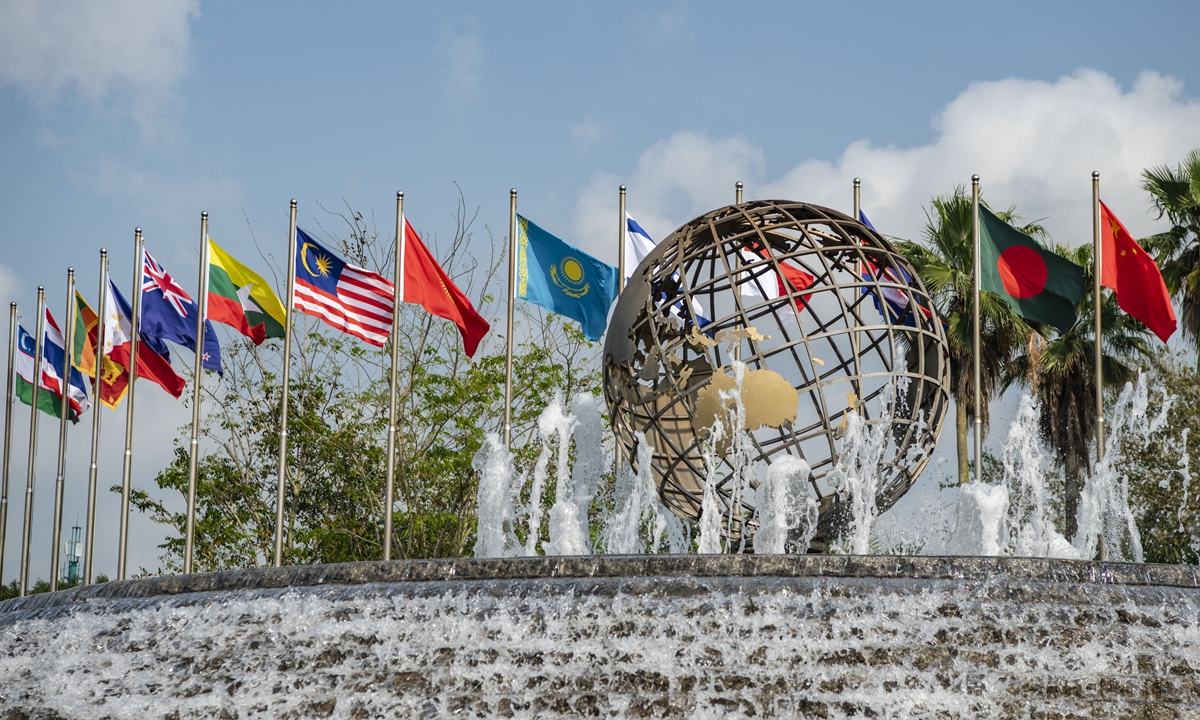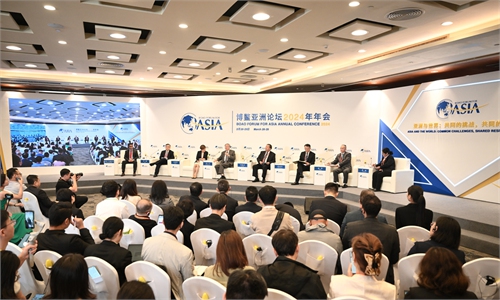
This photo taken on March 25, 2024 shows the Boao Forum for Asia (BFA) International Conference Center in Boao, South China's Hainan Province, is ready for the forum. Photo: cnsphoto
The Boao Forum for Asia (BFA) has touched off a wave of diplomatic frenzy that brings together leaders from across Asia and beyond to discuss both economic and geopolitical issues and seek answers facing the region.
Themed on "Asia and the World: Common Challenges, Shared Responsibilities," the BFA Annual Conference calls on countries around the world to jointly address global challenges and shoulder the responsibility of promoting peace and prosperity together in the four-day meetings.
The BFA itself will also see the presence of Kazakhstan's President Kassym-Jomart Tokayev, Nauru's President David W.R. Adeang, Sri Lankan Prime Minister Dinesh Gunawardena, Prime Minister of the Commonwealth of Dominica Roosevelt Skerrit, and former Cambodian prime minister Samdech Techo Hun Sen, Director General of the World Intellectual Property Organization Daren Tang, and Secretary-General of the Organization for Economic Cooperation and Development (OECDE) Mathias Cormann, according to the forum organizer.
Zhao Leji, chairman of the Standing Committee of the National People's Congress, met with representatives of the board of directors, some advisory committees and strategic partner companies of the Boao Forum on Wednesday.
According to Zhao, the theme of this year's annual meeting has responded to the common concerns of the international community. In today's world, where multiple challenges and crises are intertwined, consensus, solidarity and cooperation are all the more necessary. With its new development, China will provide more new opportunities for the world, Zhao said.
Danilo Turk, former president of Slovenia, told the Global Times on Wednesday that the BFA is a vital platform for diverse perspectives to converge and chart a path forward, with diplomatic action playing a crucial role in addressing pressing global challenges.
"These issues cannot be solved in the short term, but at least they are being addressed at the Boao Forum, which is a good starting point, especially considering China's importance as a key player in international relations," Turk told the Global Times on Wednesday.
Opportunities like the BFA are crucial for diplomatic engagements with political leaders to discuss fundamental issues such as development, security, and stability that impact not only the region but also the entire world. The COVID-19 pandemic has highlighted the importance of reconnecting through in-person meetings to reestablish dialogue and collaboration, Gilles Carbonnier, vice president of the International Committee of the Red Cross (ICRC), told the Global Times on Wednesday.
The Global Times reporters observed that as the forum's panels began on Tuesday, delegates from various parts of Asia and beyond flocked to the conference rooms very early in the morning, eager to participate in discussions. Each panel was filled to capacity, and there were always lines of people waiting to join in and listen.
Turk mentioned that in the Western world today, there is a harmful mentality and narrative that is harming regional relations. "This narrative involves the use of sanctions and countermeasures as if they were solutions to [existing] problems. It is widely known that sanctions do not achieve the intended results, but instead produce negative consequences," Turk said.
Turk mentioned there is a focus on values and moral superiority in the West, which can lead to a sense of competition based on values, where one group believes they are superior to others because of their values.
In addition, geopolitical tensions have influenced beyond to business investments across the globe. "The world today is more influenced by geopolitics than ever before, and the geopolitical influence will affect the flow of foreign direct investment," Charles Dallara from Partners Group said during a panel discussion.
"We're looking forward to seeking some insights about how geopolitical factors will impact our consultancy," a representative from KPMG International Limited told the Global Times.
China the stabilizer
In the face of such an increasingly complex and tense global geopolitical situation, China has actively played a constructive role and is committed to maintaining world and regional peace, stability and development, Xu Bu, chairman of the Institute of Global Development and Security at Jiangsu University, who attended the panel on global geopolitical outlook at the Boao Forum, told the Global Times.
He noted that one of the main reasons for the more complex geopolitical situations is that unilateralism and protectionism are still prevalent in the global geopolitical arena. Some countries have been constantly engaging in sanctions and long-arm jurisdiction as well as building "small yard, high fence," which undermines the interests of other countries, he said.
In underscoring China's role as a constructive player in global affairs, Turk praised China's global security and development initiatives as key components of its foreign policy. He commended China for its efforts in mediating cooperation between Saudi Arabia and Iran, a crucial contribution to world peace. He also highlighted China's potential to help resolve conflicts such as the Russia-Ukraine conflict by proposing for a peace conference in the Middle East.
Specifically, Xu noted that China has been actively promoting the building of a global community of shared future, a concept that advocates universal security and common prosperity. China firmly believes that only through the realization of a common, comprehensive, cooperative and sustainable security and the resolute opposition to the idea that one country's security should be built on the insecurity of others can the world have a better future.
Turk also said China's economic growth is a peace stabilizer to Asia and the world.
He said as China's high-quality development continue to progress, especially in artificial intelligence and digitalization, and this could benefit the world as a whole. China's success in developing artificial intelligence could lead to the creation of a global regulatory framework, with the country playing a key role in shaping international regulations for responsible artificial intelligence, Turk noted.
Carbonnier told the Global Times that the critical importance of China as the world's second-largest economy cannot be overstated for world peace. China has been booming for many years, and the region has seen significant development and is now considered a powerhouse in terms of economic development, science, technology and diplomacy, he said.
Alexei Overchuk, deputy prime minister of the Russian Federation, who gave remarks at the panel "Rise of the Global South," also highlighted the unity of the Global South to address challenges in face of the trend of anti-globalization, with fragmented trade, fragmented global economy and fragmented financial markets.
Overchuk noted that, when it comes to the current fragmented issues, it requires us to strengthen cooperation and connections with neighboring countries, improve economic and trade relations and cooperation with neighboring countries. In the past decade, we have seen efforts in this direction. The establishment of economic alliances is a very important effort and mechanism, such as the BRICS mechanism, he said.


